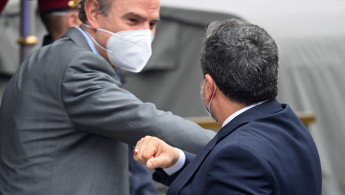Europe sees progress in latest rounds of Iran nuclear talks
European diplomats say the latest round of talks over Iran’s nuclear program has made progress, expressing hope that agreement could soon be reached for Tehran to comply with a 2015 deal aimed at curbing its atomic ambitions and also see the United States rejoin the accord.
Enrique Mora, the European Union official who chaired Wednesday's talks in Vienna, said delegations from Russia, China, Germany, France, Britain, Iran and the US would return home to brief their governments and then meet again in the Austrian capital next week.
"I'm sure that the next round will be the one in which we will finally get the deal," Mora told reporters after the meeting.
"There are a few political issues (and) there are a number of technical issues, again rather complex," he added. "But I can say that they are fewer than they were one week ago. So we are (on) a good track."
"I think every capital has to give a green light to their respective delegations to get the agreement, and I think that will be the case next week," said Mora.
"There is of course no guarantee that major sticking points will be solved, but I think it is possible that we will come to [a] positive conclusion of the talks prior to the Iranian elections on June"https://t.co/JcKsloBHXI
— The New Arab (@The_NewArab) May 27, 2021
Other European diplomats, speaking on condition of anonymity as they weren't authorized to be quoted by name, described the talks in Vienna as "intense and productive," but cautioned that they would become more difficult as delegates tackle harder issues.
While progress had been made and important aspects of a future deal had been hammered out, the diplomats said that tough decisions lie ahead and nothing would be agreed until everything was agreed.
Read also: Return of Iran nuclear deal needs only 'will': Rouhani
Asked about the United Nations' atomic watchdog this week stating that it hasn’t been able to access data important to monitoring Iran's nuclear program since late February, Mora said delegations had "taken note" of the report.
Iran started limiting inspections in a bid to put pressure on the government of US President Joe Biden to lift crippling sanctions reimposed after then-President Donald Trump pulled out of the 2015 Joint Comprehensive Plan of Action, or JCPOA, in 2018.
"It's something that is not directly related to the negotiations of the JCPOA," Mora said, referring to the UN atomic energy agency's report that it had not had access to the monitoring data since Feb. 23.





 Follow the Middle East's top stories in English at The New Arab on Google News
Follow the Middle East's top stories in English at The New Arab on Google News
![Netanyahu furiously denounced the ICC [Getty]](/sites/default/files/styles/image_330x185/public/2024-11/GettyImages-2169352575.jpg?h=199d8c1f&itok=-vRiruf5)
![Both Hamas and the Palestinian Authority welcomed the ICC arrest warrants [Getty]](/sites/default/files/styles/image_330x185/public/2024-11/GettyImages-2178351173.jpg?h=199d8c1f&itok=TV858iVg)
